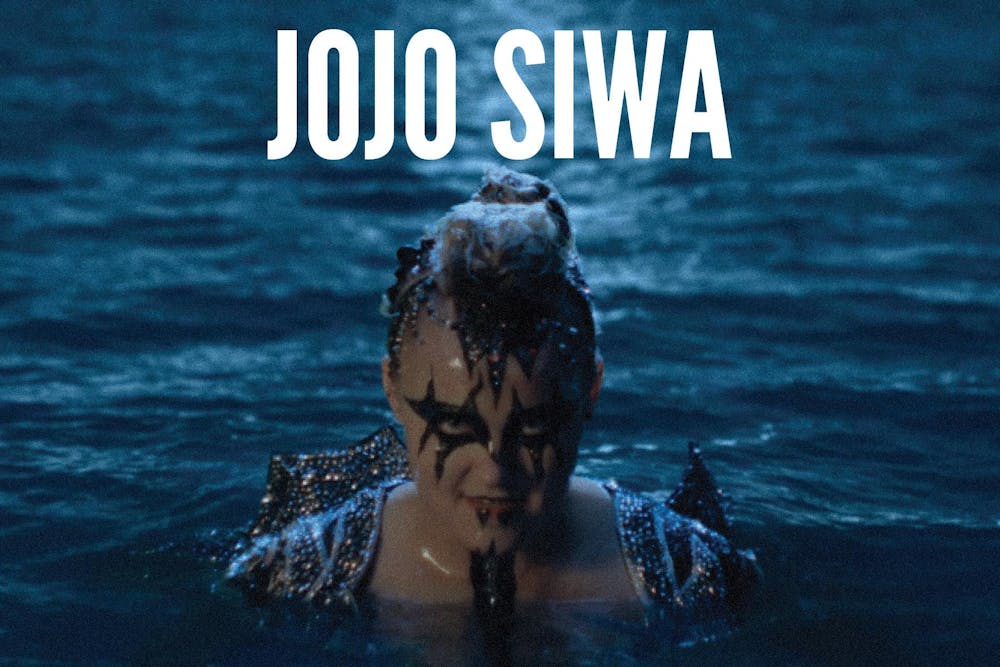Jojo Siwa is evolving again, as she always has. Oh, the Middle American moth that she is…
Siwa entered the media ecosystem at the age of 10 through the reality show “Dance Moms” and its spin-off competition show “Abby’s Ultimate Dance Competition.” Then, she was sold as a hyper-pink, hyper-girly stage kid. Slowly, Jojo and Jessalynn — her mother — wrested control of the “Jojo” brand into their own hands. She began to release kids’ music and play kids’ concerts, judge for and compete on competition shows, sell cereal and clothes, etc.
Then, in 2021, Siwa ceremoniously came out as lesbian via a viral TikTok and a People exclusive story. Simultaneously, she began to debut a more adult image: She spoke about “labels” and “pansexuality” and “queerness;” she announced that she had a girlfriend and then that she had broken up with said girlfriend.
2024, however, marks Siwa’s most recent and radical metamorphosis — into a raunchy rockstar. In the lyrics of her new single, “Karma,” which ties into her new look, she declares, “I was a bad girl, I did some bad things / I swear I did it all for fun and it meant nothing,” and, “I was a wild child, you always knew it / It was a matter of time before I blew it.” She also uses the word “b*tch,” but not the way a 20-year-old does — the way a middle schooler does while sitting around unmonitored at a lunch table. She seems to revel in it, savor it, milk it. She comes off, for the lack of a better word, chalant.
In the music video, and on the red carpet as of late, she’s donning a new look. It’s a far cry from the bow-centric, Disney Channel-type outfits she used to wear — now it’s an amalgamation of a heavy metal, Motley Crue thing and an emo, My Chemical Romance vibe. It’s a caricature of rock fashion that could only be fathomed by a Nickelodeon showrunner, or by an earnest Nebraskan striver like Siwa. At DIY shows these days, no one is dressing like Marilyn Manson. In fact, the situation is quite the opposite: Punk rock is all about ill-fitting jeans, schlubby t-shirts and unwashed hair — it’s a nuclear arms race to prove just how little you care.
The music video is very explicit, not only by Siwa’s old Great Plains standards, but by any metric. She stares longingly, kisses slowly and gropes awkwardly. To paraphrase the critic Raquel S. Benedict, it is — like everything these days — sexual without being sexy. It feels like Siwa is selling lesbian eroticism the same way she used to sell pink bows for Walmart (or the way she used to sell asbestos-filled make-up for Claire’s). It seems stilted, frigid and disingenuous.
It’s not just Siwa, though. Raunch, it seems, is in. On “The Tortured Poets Department,” Taylor Swift swears more than in any of her previous albums. Olivia Rodrigo’s “GUTS” started as a hit among tweens when it first dropped, but since the tour, she’s been hamming up the sex appeal — performing explicit versions of her tracks, wearing revealing costumes and even distributing Plan B to her audience.
Critic Paul Skallas writes about “the Vulgar Wave,” a period from 1990 to 2007 during which the culture industry catered primarily to young men (think shows like “House” and movies by Adam Sandler). Siwa’s commercial lasciviousness sticks out like a sore thumb because she’s chronically and terminally unsubtle, but her recent outburst might represent something more than just that. Perhaps we’re on the verge of a New Vulgar Age, one geared toward young women. Time will tell, but it seems so.










